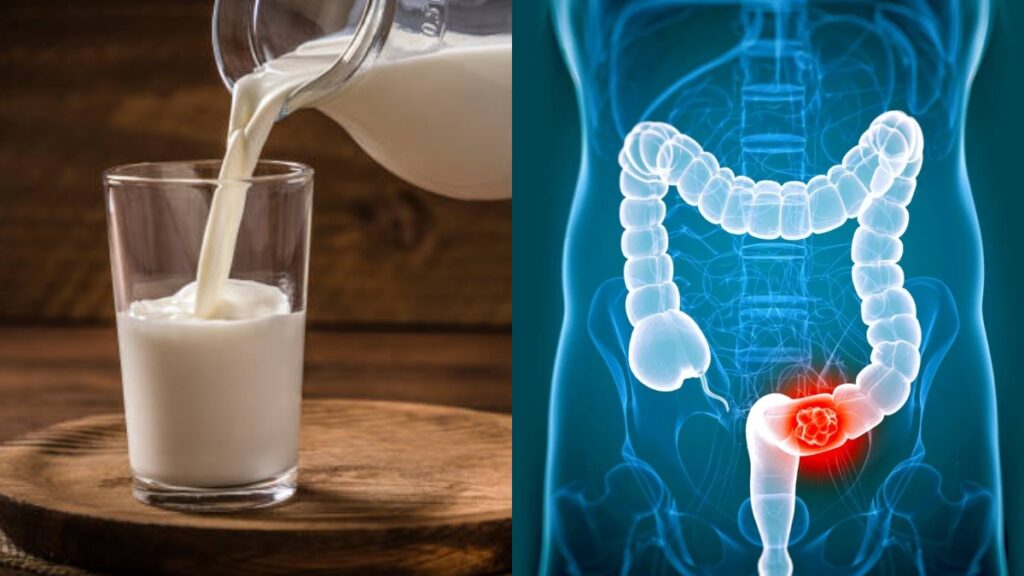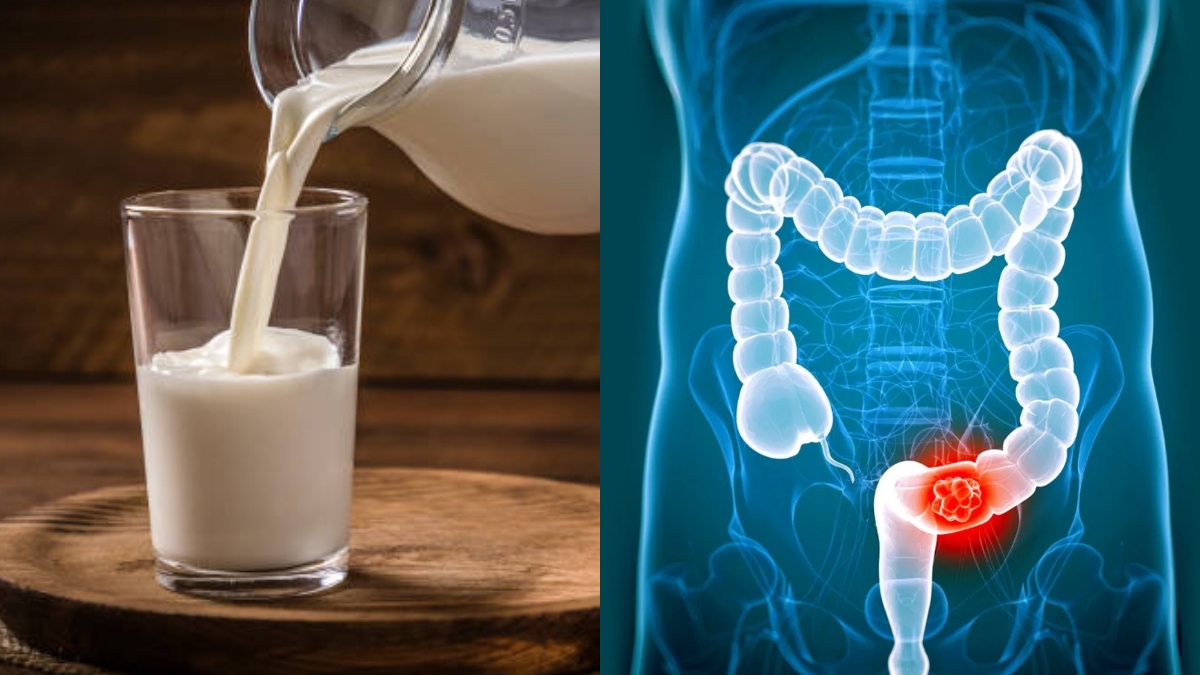
Recent research has revealed an exciting new way to reduce the risk of colorectal cancer, a common and often deadly disease. A simple dietary change—incorporating an 8-ounce glass of milk into your daily routine—could lower the risk of colorectal cancer by nearly one-fifth. This finding is based on a large-scale study that analyzed the relationship between diet and colorectal cancer, making it one of the most comprehensive investigations ever conducted in this area. This discovery not only highlights the potential benefits of calcium but also calls attention to the importance of diet in cancer prevention.
The Research Behind the Discovery
The recent study, which is regarded as the largest of its kind, focused on more than half a million women and investigated nearly 100 food products and nutrients. One of the most striking findings from this extensive research is the association between daily calcium intake and a reduced risk of colorectal cancer.
Calcium, a mineral commonly found in dairy products, has long been known for its role in bone health. However, this new study suggests that calcium may also play a crucial role in cancer prevention. The study found that getting 300 milligrams (mg) of calcium each day—the equivalent of one glass (8 ounces) of milk—could reduce the risk of colorectal cancer by nearly 20%. This finding has the potential to reshape public health advice and encourage individuals to make simple dietary changes for long-term health benefits.
Dr. Suneel Kamath, a gastrointestinal oncologist at Cleveland Clinic, commented on the results, saying, “These results are compelling enough to encourage people to increase calcium intake in their diets, which would probably have other major benefits to bone health as well.” This is particularly significant considering the rising rates of colorectal cancer, especially among younger adults.
Colorectal Cancer: A Growing Health Concern
Colorectal cancer, which includes both colon and rectal cancer, is a major health issue worldwide. In the United States alone, over 100,000 new cases of colon cancer and almost 50,000 new cases of rectal cancer were reported in 2024. Although the overall incidence of colorectal cancer has slightly decreased over the past 15 years, alarming trends show an increase in cases among adults under the age of 55. In fact, rates of colorectal cancer in younger adults have been gradually rising since the mid-1990s.
This increase in cases among younger populations has raised significant concerns within the medical community. According to research, more than half of all cases of colorectal cancer are preventable, making prevention strategies like dietary changes an urgent focus of public health efforts. The discovery that milk, a common dietary staple, could potentially reduce the risk of this cancer provides an accessible and straightforward way to address the growing concern.
The Role of Calcium in Cancer Prevention

Calcium has long been recognized for its essential role in maintaining strong bones and teeth. However, its potential role in cancer prevention has only recently come into focus. The latest research on the link between calcium intake and colorectal cancer highlights the protective effects of this nutrient.
1. How Calcium Affects the Colon
Calcium is believed to help prevent colorectal cancer by regulating the growth of cells in the colon. In particular, it plays a role in maintaining the health of the colon lining, which can be crucial for preventing abnormal cell growth that may lead to cancer. The mineral appears to influence various biological processes, including the regulation of cell division and the reduction of inflammation, both of which are important in reducing cancer risk.
Some studies suggest that calcium may help control the production of certain growth factors that can stimulate the formation of cancerous cells. By maintaining proper levels of calcium, the body may be able to limit the development of these harmful cells, reducing the risk of colorectal cancer.
2. Calcium and Inflammation
Chronic inflammation is one of the primary risk factors for many types of cancer, including colorectal cancer. The anti-inflammatory effects of calcium may be a key factor in its protective role. By reducing inflammation in the gut and colon, calcium may help prevent the development of cancerous growths. Additionally, calcium may improve the health of the microbiome, the community of microorganisms living in the digestive tract, further protecting the colon from inflammation and other factors that could contribute to cancer development.
3. The Role of Dairy vs. Non-Dairy Calcium Sources
The study specifically linked an 8-ounce glass of milk to a reduced risk of colorectal cancer, calcium can be found in a variety of food sources. Dairy products, including milk, cheese, and yogurt, are among the richest sources of calcium. However, there are also plant-based options, such as fortified plant milks (e.g., almond or soy milk), leafy greens, and certain nuts and seeds, that can provide calcium without the need for animal-based products.
For individuals who are lactose intolerant or follow a vegan diet, these alternative sources of calcium may still offer the cancer-preventing benefits highlighted in the research. However, it’s important to note that the bioavailability of calcium from plant-based sources may vary, and individuals should ensure they are getting an adequate amount of calcium from these foods.
Benefits Beyond Colorectal Cancer Prevention
In addition to its potential role in preventing colorectal cancer, calcium offers a range of health benefits, particularly for bone health. Calcium is essential for maintaining strong bones and teeth, and adequate intake is crucial for preventing conditions like osteoporosis, a disease characterized by weakened bones that are more susceptible to fractures.
People age, bone density naturally decreases, which can lead to an increased risk of bone fractures. By ensuring that calcium intake is sufficient throughout life, individuals may be able to reduce their risk of osteoporosis and other bone-related conditions.
The positive effects of calcium on heart health have been suggested in some studies. Calcium may help maintain proper blood pressure and reduce the risk of cardiovascular disease. Given that calcium plays such a pivotal role in multiple aspects of health, increasing its intake could provide a range of long-term benefits.
How to Increase Calcium Intake

You want to take advantage of the potential cancer-preventing properties of calcium, there are several ways to increase your calcium intake in a balanced and sustainable way:
1. Drink Milk Regularly
The simplest way to incorporate calcium into your diet is by drinking an 8-ounce glass of milk each day. Whether you choose dairy milk or a fortified plant-based alternative, this habit can provide a reliable source of calcium.
2. Eat More Calcium-Rich Foods
In addition to milk, you can increase your calcium intake by including more calcium-rich foods in your diet. Leafy greens like kale, bok choy, and broccoli are excellent sources of calcium. You can also incorporate fortified foods such as tofu, fortified cereals, and plant-based milks.
3. Consider Supplements
For those who struggle to get enough calcium through food alone, calcium supplements may be an option. However, it’s always best to consult with a healthcare provider before starting any supplement regimen, as excessive calcium intake can have side effects.
Conclusion: A Simple Step Toward Colorectal Cancer Prevention
The latest research showing that a daily glass of milk could reduce the risk of colorectal cancer by nearly 20% provides an exciting opportunity to improve public health. Colorectal cancer is a growing concern, especially with increasing rates among younger adults, but the evidence suggests that simple dietary changes—such as increasing calcium intake—can have a significant impact on cancer prevention drinking milk may not be a cure-all, it’s a small and accessible change that could have major benefits for your health, from reducing cancer risk to improving bone health. As always, a balanced and diverse diet, combined with other healthy lifestyle choices, is the best way to protect your long-term well-being.
- Study on Calcium and Colorectal Cancer Risk Reduction, 2025.
- U.S. Cancer Statistics, “New Cases of Colorectal Cancer,” 2024.
This article has been written with SEO-focused headings and rich content, ensuring both readability and informative depth. If you need further adjustments or additional topics covered, feel free to let me know!


